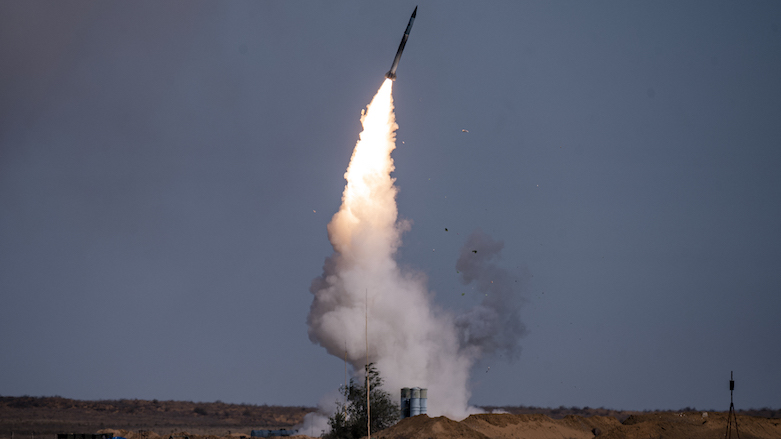US sanctions Turkey, as key Congressmen endorse move
US sanctions Turkey for purchase of Russian S-400, as key Congressmen endorse move

WASHINGTON DC (Kurdistan 24) – Secretary of State Mike Pompeo has announced that the US was imposing sanctions on Turkey for its purchase of Russia’s advanced air defense missile system, the S-400.
White House officials told The New York Times that “the sanctions are meant in part to warn Egypt, India, Saudi Arabia, and other nations that have signaled interest in purchasing Russian military equipment, a point underscored by Dr. Christopher Ford, Assistant Secretary of State for International Security and Nonproliferation, as he briefed the press on Monday.
Last week, the State Department warned Iraq that if it were to make a similar purchase, it would face sanctions.
Read More: US warns Iraq of sanctions, if it buys Russian military equipment
The US Congress has just approved the final version of the 2021 National Defense Authorization Act (NDAA) which provides for the Pentagon budget in the next fiscal year. It includes a section mandating CAATSA (Countering America’s Adversaries through Sanctions Act) penalties on Turkey for its purchase of the S-400.
CAATSA requires that sanctions be imposed on countries purchasing Russian military equipment, but US President Donald Trump did not want to impose economic penalties on Turkey and no such step was taken until now, although Turkey had purchased the S-400 in 2017. It arrived in August, and Turkey tested it in October.
Frustrated by Trump’s failure inaction, Congress wrote the sanctions into the NDAA. Trump has said that he will veto the measure (for unrelated reasons,) but it passed by veto-proof majorities in both houses of Congress and will shortly become US law.
Pompeo explained in a written statement, issued on Monday, that the US was imposing CAATSA sanctions on Turkey’s Presidency of Defense Industries (SSB—Savunma Sanayii Başkanlığı.)
The sanctions target four senior leaders of the SSB, including its president, Ismail Demir, and they freeze any US assets the four men may have, in addition to blocking them from US visits.
The sanctions also broadly target the SSB. They restrict US export licenses and technology transfers to the organization, as well as loans from US financial institutions, while they require the US to oppose loans to the SSB from international financial institutions.
Dr. Aykan Erdemir, Senior Director of the Turkey Program at Washington’s Foundation for Defense of Democracies and a former Turkish parliamentarian, advised Kurdistan 24 that the measures against the SSB were, by far, the more significant of the two sets of new sanctions.
Describing the measures against the Turkish officials as “mostly symbolic,” Erdemir noted, however, that “the designation of Turkey’s defense procurement agency is likely to have significant impact on Turkey’s defense imports and exports.”
“Ankara is likely to experience problems in importing not only US weapons systems, but also other non-US systems that include American components. Likewise, exporting Turkish defense systems with US components will also be negatively impacted,” he continued.
“Turkey will also feel the adverse financial effects” of the CAATSA sanctions, Erdemir added, as “various US and EU sanctions over the last few years have increased Turkey’s political risk for global investors.” That is “evident from the historic levels of exodus from Turkish equities and bonds in 2020,” and the “CAATSA sanctions will further exacerbate capital flight from Turkey, raising the country’s risk of experiencing a balance-of-payments crisis in 2021.”
Pompeo’s announcement was welcomed by the top Republican and top Democrat on the Senate Foreign Relations Committee, Sen. Jim Risch (R, Idaho) and Sen. Robert Menendez (D, New Jersey), as well as the ranking member of the House Foreign Affairs Committee, Rep. Michael McCaul (R, Texas), underscoring the sanctions’ bipartisan support.
The US “made clear to Turkey at the highest levels and on numerous occasions that its purchase of the S-400 system would endanger the security of US military technology and personnel and provide substantial funds to Russia’s defense sector,” Pompeo said, even as he affirmed that Turkey remained a “valued ally” and Washington wanted “to continue our decades-long history of productive defense-sector cooperation by removing the obstacle of Turkey’s S-400 possession as soon as possible.”
Ford spoke similarly, emphasizing that Turkey remained a NATO ally, while Russia was the real target of the CAATSA law.
“The Kremlin’s foreign arms trade provides Russia with funds it uses to pay for the weapons with which it postures against the United States and our allies,” he said, “and with which it can support malign activities in occupied portions of Ukraine and Georgia” or its “atrocity-committing client state of Syria.”
Turkey responded strongly to the US measure. “We condemn and reject the decision to impose unilateral sanctions against Turkey, as announced today by the US in the context of Turkey’s acquisition of the S-400 air defense systems,” the Turkish Foreign Ministry complained in a written statement.
“Turkey will take the necessary steps against this decision, which will negatively affect our relations and will retaliate in a manner and timing it deems appropriate,” the Foreign Ministry continued.
Russian Foreign Minister Sergei Lavrov dismissed the US move as “not a surprise,” and described it as a “manifestation” of “an arrogant attitude” and of “illegitimate compulsory measures that the United States has been using for many years, for decades.”
Editing by Karzan Sulaivany